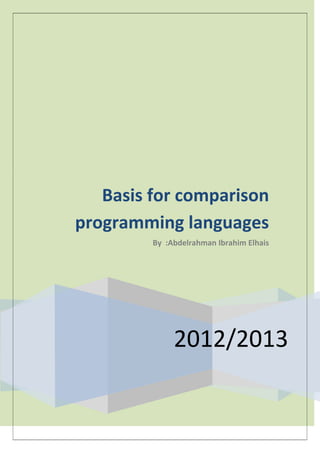
Basis for comparison programming languages
- 1. Basis for comparison programming languages By :Abdelrahman Ibrahim Elhais 2012/2013
- 2. Object orientation: There are several qualities for Object Oriented Languages: Encapsulation Inheritance Polymorphism/dynamic binding. All operation performed by sending messages to object. All user-defined types are object. Java C# C++ Paython Visual basic Hybrid Hybrid Hybrid/multi Hybrid Particular -paradigm support Static vs. dynamic typing A dynamic type system doesn't require variables to be declared as a specific type. Statically type languages requires that all variables are declared with specific type. Java C# C++ Paython Visual basic Static Static Static Dynamic Static
- 3. Generic classes: refer to the ability to parameterize a class with specific data types. it allows statically typed languages to retain their compile- time type safety. Dynamically typed languages do not need parameterized types in order to support generic programming. Java C# C++ Paython Visual basic No No Yes N/A No Inheritance : the ability for a class or object to be defined as an extension or specialization of another class or object. Most object-oriented languages support class-based inheritance. others such as SELF and JavaScript support object-based inheritance. A few languages, notably Python and Ruby, support both class- and object-based inheritance. Java C# C++ Paython Visual basic Single class Single class – multiple multiple None –multiple multiple interfaces interfaces
- 4. Feature renaming: Feature renaming is the ability for a class or object to rename one of its features (a term used to collectively refer to attributes and methods) that it inherited from a super class. Java C# C++ Paython Visual basic yes yes– yes No No Method overloading: Method overloading (also referred to as parametric polymorphism) is the ability for a class, module, or other scope to have two or more methods with the same name. Calls to these methods are disambiguated by the number and/or type of arguments passed to the method at the call site. Java C# C++ Paython Visual basic yes yes yes No No
- 5. Operator overloading: ability for a programmer to define an operator (such as +, or *) for user-defined types. Java C# C++ Paython Visual basic No Yes yes Yes No Higher Order Functions and Lexical Closures Higher Order Functions: functions that can be treated as if they were data objects. they can be bound to variables (including the ability to be stored in collections). can be passed to other functions as parameters. can be returned as the result of other functions. Lexical Closure: bundling up the lexical (static) scope surrounding the function with the function itself, so that the function carries its surrounding environment around with it wherever it may be used. Java C# C++ Paython Visual basic
- 6. No Yes yes Yes No Garbage Collection: mechanism allowing a language implementation to free memory of unused objects on behalf of the programmer. Reference Counting Mark and Sweep Generational D Java C# C++ Paython Visual basic Mark Mark and None Reference Reference and sweep sweep Uniform Access: All services offered by a mod-ule should be available through a notation, which does not betray whether they are implemented through storage or through computation. Java C# C++ Paython Visual basic No No No No Yes
- 7. Class Variables/Methods: Class variables and methods are owned by a class, and not any particular instance of a class This means that for however many instances of a class exist at any given point in time, only one copy of each class variable/method exists and is shared by every instance of the class. Java C# C++ Paython Visual basic yes Yes yes No Yes Reflection: ability for a program to determine various pieces of information about an object at run-time. Most object- oriented languages support some form of reection.this includes the ability to determine: the type of the object, its inheritance structure, and the methods it contains, including the number and types of parameters and return types . It might also include the ability for determining the names and types
- 8. Java C# C++ Paython Visual basic yes Yes No Yes No Access Control: ability for a modules implementation to remain hidden behind its public interface. Java C# C++ Paython Visual basic Public –private Public – Public –private Name Public-private -protected private -protected mangling -protected Design by Contract: Design by Contract (DBC) is the ability to incorporate important aspects of a specification into the software that is implementing it. The most important features of DBC are: Pre-conditions, which are conditions that must be true before a method is invoked Post-conditions, which are conditions guaranteed to be true after the invocation of a method. Invariants, which are conditions guaranteed to be true at any stable point during the lifetime of an object.. .
- 9. Java C# C++ Paython Visual basic No No No No No Multithreading: ability for a single process to process two or more tasks concurrently. Java C# C++ Paython Visual basic Yes Yes libraries Yes No Regular Expressions: pattern matching constructs capable of recognizing the class of languages known as regular languages. D Java C# C++ Paython Visual basic Standard Standard No Standard No libraries libraries libraries Pointer Arithmetic : ability for a language to directly manipulate memory addresses and their contents.
- 10. D Java C# C++ Paython Visual basic No Yes Yes No No Language Integration: It is important for a high level language (particularly interpreted languages) to be able to integrate seamlessly with other languages. Java C# C++ Paython Visual basic With All .net With With With c c,c++ languages c,assembler c,c++,java Built-In Security: language implementations ability to determine whether or not a piece of code comes from a trusted source (such as the users hard disk), limiting the permissions of the code if it does not. Java C# C++ Paython Visual basic Yes Yes No No No
